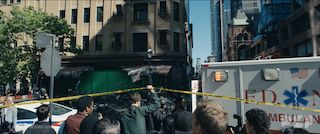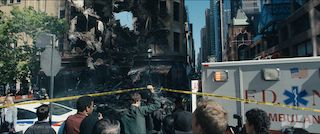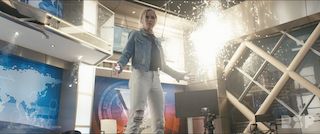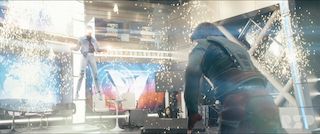 In its second outing with the wildly popular superhero drama The Boys, developed by Eric Kripke and based on the comic book by Garth Ennis and Darick Robertson, Rising Sun Pictures delivered more than 100 visual effects shots for the show’s eight-episode third season. The studio’s contributions included a jaw-dropping sequence that opens the first episode, depicting the spectacular, near total destruction of New York City.
In its second outing with the wildly popular superhero drama The Boys, developed by Eric Kripke and based on the comic book by Garth Ennis and Darick Robertson, Rising Sun Pictures delivered more than 100 visual effects shots for the show’s eight-episode third season. The studio’s contributions included a jaw-dropping sequence that opens the first episode, depicting the spectacular, near total destruction of New York City.
Working under the direction of series visual effects supervisor Stephan Fleet and VFX producer Shalena Oxley-Butler, RSP’s team built on its standout work for season two, producing a wide range of extravagant 4K visuals. “Our work for the new season included some of the most challenging sequences we’ve ever undertaken for a streaming series,” says RSP VFX supervisor Dennis Jones. “It required a tremendous effort from all departments to produce high-quality, hyper-real 2D and 3D elements and detailed set extensions and matte paintings. As some shots involved dozens of high-resolution render layers, the project also posed a huge data management challenge.”
 “During season two, we learned a lot about Eric’s vision for the show,” adds RSP head of production Meredith Meyer-Nichols. “We’ve also developed a wonderful rapport with Stephan and Shalena, who do a superb job of managing the process and keeping the focus on the unique universe of The Boys. Our artists are big fans of the series and responded with some of their best work.”
“During season two, we learned a lot about Eric’s vision for the show,” adds RSP head of production Meredith Meyer-Nichols. “We’ve also developed a wonderful rapport with Stephan and Shalena, who do a superb job of managing the process and keeping the focus on the unique universe of The Boys. Our artists are big fans of the series and responded with some of their best work.”
RSP’s most impressive handiwork appears at the very outset of the new season in the extended opening sequence to the first episode as Vought Tower and its New York City environs are reduced to piles of burning rubble and billowy pillars of smoke. The sequence is ultimately revealed as not real, but rather a scene from a movie, Dawn of the Seven, that was first introduced in season two.
 The studio’s 2D and 3D departments collaborated in producing a photo-real, but stylized model of Manhattan, and then blowing it apart, bit by bit in a savage montage of accelerating fury. “Eric Kripke and his production team were keen to show massive destruction,” notes CG supervisor Prema Paetsch. “We went through numerous iterations, each one more destroyed, and they kept asking for ‘more!’ For us, it came down to finding the right recipe, figuring out how far we could push the 3D and then topping it off with digital matte paintings and tons of effects.”
The studio’s 2D and 3D departments collaborated in producing a photo-real, but stylized model of Manhattan, and then blowing it apart, bit by bit in a savage montage of accelerating fury. “Eric Kripke and his production team were keen to show massive destruction,” notes CG supervisor Prema Paetsch. “We went through numerous iterations, each one more destroyed, and they kept asking for ‘more!’ For us, it came down to finding the right recipe, figuring out how far we could push the 3D and then topping it off with digital matte paintings and tons of effects.”
 Despite its manic intensity, the scene is constructed with deliberate care. “The level of destruction follows a defined arc and is tightly choreographed,” observes VFX producer Amy Tinker. “The opening shot is 26 seconds long, so you see every painful detail. As your eye follows the camera, you watch a building crumble and debris fall until it is succeeded by another event—a terrific explosion with more wreckage raining from the sky.”
Despite its manic intensity, the scene is constructed with deliberate care. “The level of destruction follows a defined arc and is tightly choreographed,” observes VFX producer Amy Tinker. “The opening shot is 26 seconds long, so you see every painful detail. As your eye follows the camera, you watch a building crumble and debris fall until it is succeeded by another event—a terrific explosion with more wreckage raining from the sky.”
RSP developed an innovative workflow to facilitate creative back and forth with the show’s production team while maintaining high quality and hitting deadlines. “We kept the entire pipeline light enough so that we could respond to direction and apply changes rapidly, while moving forward with our shaders and final composites,” explains composite supervisor Antony Haberl. “We spent a lot of time building our base models and textures knowing that, as the sequence evolved, we’d be adding more layers. Right down to the very end, we were applying smoke, haze, falling embers and other effects to make the scene more visceral and violently real.”
RSP also played a role in visualizing the powers of a new character, the Crimson Countess (Laurie Holden). She appears in a scene set inside the theme park VoughtLand where she unleashes her fury on a Homelander mascot. “She employs her power of pyrokinesis to form a ball of fire in her hands,” says Haberl. “We supplied the explosion, the gore and the blood splattering everywhere.”
Significantly, the scene in the theme park sets up a flashback sequence that occurs during the Nicaraguan Revolution as a pair of soldiers suffer a fate like the unfortunate mascot. “The two soldiers are fleeing a battle when they are killed by a ball of fire,” Haberl says. “We built match-move rigs and body doubles to substitute for the live actors, and added an explosion that in size, scope and energy was physically accurate.”
